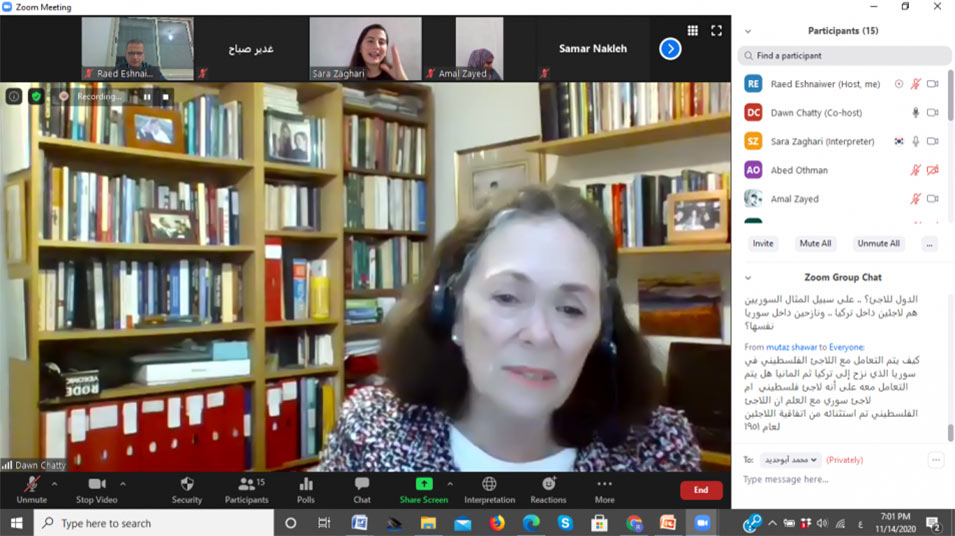Students join Professor Emerita Dawn Chatty in online discussion on forced migration, refugees in Greater Syria
Students enrolled in the university’s International Migration and Refugee Studies master’s program reviewed the history of forced migration and displacement in the Levant — which includes Syria, Lebanon, Jordan, Palestine, and Turkey — in an online discussion with Dawn Chatty, professor emerita of anthropology and forced migration who previously held directorship of the Refugee Studies Centre at the University of Oxford.
The discussion is part of a series of talks, led by Raed Eshnaiwer, a professor at the Ibrahim Abu-Lughod Institute of International Studies, that hosts professors and experts on migration and forced displacement as well as activists, refugees, and migrants from areas all over the world to present students with authentic experiences from which they could draw lessons and inspiration.
In her presentation on the history of migration and displacement in the Levant area, Chatty introduced her latest book on the topic, “Syria: The Making and Unmaking of a Refuge State,” which traces the movement of refugees to the Levant, and especially Syria, during and after the collapse of the Ottoman Empire.
Following the historical narrative set in the book, Chatty discussed the waves of refugees flowing into Syria and the Levant since the middle of the 19th century, beginning with the Circassians and Chechnyan in the 1850s; refugees of the Balkan Wars at the end of the 19th century; Armenian refugees in the early 1900s; Palestinian refugees after the Israeli occupation of 1948 and 1967, as well as Palestinians who left Kuwait after the Gulf War in 1990-1991; and Iraqi refugees after the 2003 invasion.
Chatty argued that the Ottoman Empire succeeded in integrating migrants within Greater Syria by first housing them in schools, mosques, and religious schools — which included soup kitchens and simple dormitories for religious students (tekiyyes) — and then providing them with permanent housing and land to farm and live off from. Another element that the author highlighted in her book was the concept of “karam” or generosity in the Levant, which as she argues is embedded within the culture and was central to the success of migrant integration in the area. Despite its relative success, however, the Ottoman migrant integration efforts are rarely discussed within the forced migration and displacement studies field, she added.
Moving to the present day, Chatty discussed the current Syrian refugee crisis and the response from various countries around the world. Historically, she noted, countries referred to as part of the Global South are more willing to admit migrants, while countries that are considered to be part of the Global North are less willing to accept refugees despite having more resources and constituting the majority of signatories to the 1951 Refugee Convention.
This lecture is part of the KnowWar project, which includes partners such as the Department of Development Studies at the University of Vienna, the Centre for Development Studies at Birzeit University, and the Syrian Center for Policy Research, among others.







